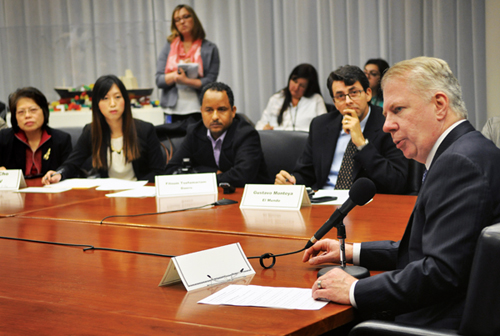By Sue Misao
Northwest Asian Weekly

About a dozen reporters attended a press conference given by Mayor Ed Murray for local and regional ethnic media at Seattle City Hall on April 1. Here, seated at the table, from left, are Jenny Kung and Andrea Hu from AATTV, Fitsum Tsefamariam from Daero, and Gustavo Montoya from El Mundo. (Photo by Sue Misao/NWAW)
Seattle Mayor Ed Murray called members of ethnic media to City Hall for a half-hour press conference on April 1, to discuss issues facing their immigrant and minority readers. Coincidentally, it was the 119th anniversary of the very day the mayor’s own grandfather came to America, he said, evoking his immigrant roots.
Murray took questions from about a dozen reporters from AATTV, the Korean Daily, the International Examiner, El Mundo, the North American Post, Daero, Seattle Chinese Times, the Northwest Asian Weekly, Seattle Chinese Post, and others. Topics covered immigrants, the police, minimum wage, the taxi industry, small businesses, and technology.
The first thing the mayor wanted to discuss was the upcoming Seattle Neighborhood Summit on April 5 at the Seattle Center, which will focus on the needs of local businesses and residents in terms of growth, diversity, schools, and economic equity. The second thing was the increased funding for the “newly energized” Office of Immigration and Refugee Affairs (OIRA), whose director, Aaliyah Gupta, was also on hand. Noting that one in five residents of Seattle are foreign-born, the mayor stressed the importance of serving immigrants’ needs.
Gupta said the goals of OIRA are to strengthen language access, expand ESL programs, support immigrant-owned small businesses, promote citizenship, and build trust.
The mayor agreed with one questioner that many immigrants’ skills are underutilized in their fields of expertise. He said that OIRA would target colleges and universities to address those issues and find ways to get highly skilled people certified for work. He also said he wanted to work with U.S. Citizenship and Immigration Services to promote naturalization of eligible local residents.
The issue of the $15/hour minimum wage garnered several inquiries, specifically regarding how small and minority-owned businesses will afford to pay it. The mayor said his task force will bring business owners, labor leaders, and nonprofit organizations together to hammer out a way to raise the minimum wage without hurting small businesses. He also said he “would be happy to come to the International District” to specifically address both that issue and the business disruptions caused by the streetcar construction. He said he would bring his minimum wage task force and members of the City Council along.
The mayor responded to questions about Seattle’s police force, stating that last week he received a letter from the Department of Justice addressing the city’s progress. Since becoming mayor, he said, Seattle’s police force has “the most diverse command staff in the city’s history,” citing the department’s recent hiring of two East African Americans for the first time.
“We have a lot of work to do to bring people of color into the command staff,” he said, stressing the importance of a police force that reflects and relates to the community it serves. The mayor asked those in attendance to help him by informing their readers of opportunities to join the police force. The papers offered to sell him ads to that effect.
Regarding broadband access, the mayor denied reports that he specifically supported lifting rules on CenturyLink, saying he hadn’t decided yet, and that he is working with technology people to provide access to every citizen at a reasonable cost.
The mayor also discussed how the city will be working its way “through a very complex series of issues” facing the taxi industry. “We need to de-regulate,” he said, adding that Seattle taxis currently pay the most expensive insurance rates in the nation. He said regulations should continue for insurance, equipment safety, and background checks on drivers.
The mayor promised the city would spend money on advertising in ethnic media outlets when there is a need to disseminate information to their specific readers. (end)
Sue Misao can be reached at editor@nwasianweekly.com.


